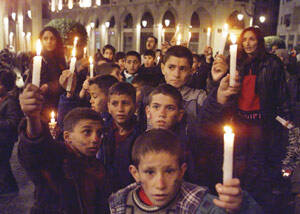The Middle East was once called the cradle of Christianity because the faith first flourished in the lands from Mesopotamia to Anatolia (modern-day Iraq and Turkey) in Syria, Lebanon and the Holy Land. But since the late 19th century, Middle Eastern Christians have been emigrating to flee conflict and to find a better life. In the last several decades, armed conflict and religious persecution have taken an exceptional toll on the Christians of the region.
The Christian population of Iraq has dropped by more than half, and Christians are emigrating from Lebanon, Israel, Palestine and Egypt too. Across the Middle East Christians of various traditions continue to suffer from prejudice, interreligious tensions and persecution. It is not surprising then that the Chaldean bishops, who lead a church indigenous to Iraq, petitioned Pope Benedict XVI to convoke a special assembly of the Synod of Bishops this month to consider the situation of the Christians in the Middle East.
International and Interfaith Pressures
The predicament of Middle Eastern Christians results from both international and interfaith hostilities. The flight of Christians from Iraq, as well as the pressures that the Christians who remain there endure from fundamentalist Muslims, is due to the breakdown of communal relations and law enforcement following the American invasion in 2003. The lack of resolution of the Palestinian question and the 2006 Israeli war against Hezbollah in Lebanon have led directly to Christian emigration in a desire to escape violence, occupation and insecurity. Indirectly, the strengthening of militant Muslim parties, like Hezbollah and Hamas, a result of the failure to resolve the conflict and of exploitation of the resulting deadlock for partisan advantage, has also put Christians at a disadvantage and driven many away from their ancestral homes.
For decades Lebanon had been a sanctuary for Arab Christians and a model of cosmopolitan living. After a long civil war, Israeli occupation and repeated punitive attacks, including the 2006 war, the fragile Lebanese government has been forced to accept the Islamic resistance group Hezbollah (Party of God) as a major partner in its coalition. Secular Arab governments in Syria and the northern West Bank are welcoming to Christians. But with an influx of rural Muslim people into formerly Christian areas like Bethlehem, local Christians sometimes feel hostility from their newly arrived neighbors.
Insecurity in the Holy Land, along with Israel’s efforts to bring East Jerusalem and parts of the West Bank and its resources, especially water, still more completely under its own control, has made life ever more difficult for Palestinians, both Christians and Muslims. A government in Jerusalem with key ministries under control of the settlers’ movement has led to more burdensome policies not only for local Arab Christians but also for international church workers and the institutions they serve.
Comprehensive, Regional Peace
In 2010, building a peace in the Middle East hospitable to Christians will require action on three fronts: 1) care for refugees; 2) reciprocity in interreligious relations; and 3) an Arab-Israeli peace accord.
Refugees. Adequate provision must be made for supporting the unrecognized masses of refugees, Christian and Muslim, across the region. For Western donors, investing in refugee care, return or resettlement and integration will be a far better investment in peace than subsidizing more arms for the governments of the region. Despite vast sums given for armaments and development over many years, hundreds of thousands of refugees in the shadows eke out an existence off the official rolls.
The refugees’ human dignity demands that countries of origin, host countries and the international community find ways to provide for their sustenance, health care and education. In addition, a route must be found to their full integration as citizens in their old home country or a new one. Work on a framework treaty on refugees should not wait until there is agreement on settlement of specific conflicts, especially the Israeli-Palestinian one, but should serve as an aid to concluding a regional agreement.
Reciprocity in Interreligious Relations. Pope Benedict XVI has introduced “reciprocity” as an issue for interreligious dialogue, that is, the recognition and implementation of the same human rights and religious liberty in other countries, especially Muslim ones, that are found in Western countries rooted in the Christian tradition. Peacemaking requires an expansion and intensification of interreligious dialogue in the Middle East at all levels. But without reciprocity the contribution of dialogue to peace will be frail and inauthentic.
Unless Jews, Christians and Muslims share the same rights as citizens and as members of religious communities, the prejudices and resentments that feed conflict will continue to smolder until conflict breaks out again. Guarantees for religious liberty everywhere should include a special statute upholding the rights of Jews, Christians and Muslims in Jerusalem and the shrines of the Holy Land.
Regional Peace Accords. The direct talks between Palestinian and Israeli leaders initiated by the Obama administration are a positive development. A bilateral Israeli-Palestinian peace agreement, however, is not enough. The settlement of the Palestinian question must be part of a regional peace agreement, like that proposed by Arab leaders in 2002. Leaders like Egypt’s President Hosni Mubarak and King Abdullah of Jordan have been helpful in the past. But other neighbors, especially Lebanon and Syria, must be drawn into the process. Both are homes to sizable Christian populations who remain at risk without a regional peace.
In addition, talks should resume along the lines of the Madrid plan of 1991 addressing long-term regional problems, including water, environment, refugees, economic development and arms control with a nuclear-free zone. Peacemaking must reduce the causes of hostility and lay foundations for a shared future.
View a video report from one Christian community in Israel.








